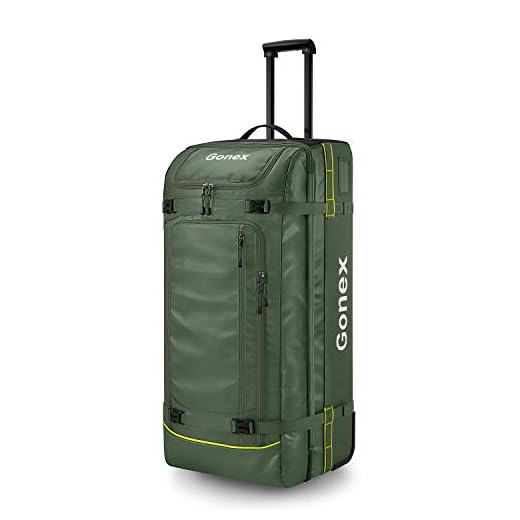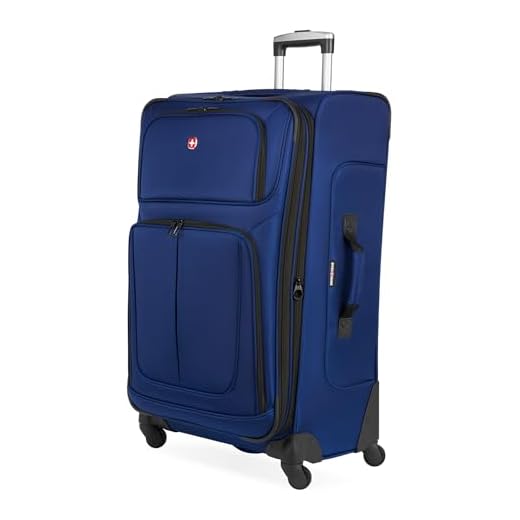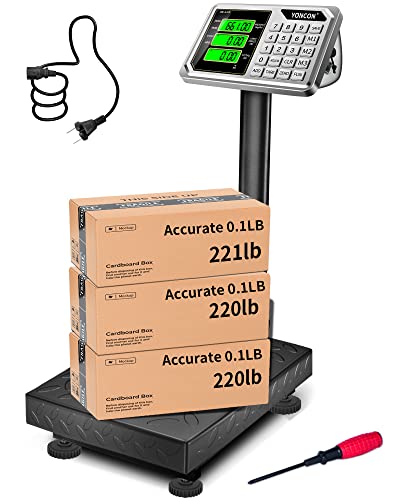

For travelers prioritizing durability and protection, rigid carriers are the superior choice. They are designed to withstand impact, keeping contents secure during transit. The inflexible exterior prevents crushing and damage from mishaps that may occur during handling.
On the other hand, soft carriers offer advantages in terms of flexibility and weight. They can easily fit into tight spaces and adapt to varying sizes of belongings, providing more room for packing. If your travels involve varied terrains and require frequently moving through crowded areas, these models may be your ideal option.
Another factor is price. Rigid options typically come with a higher price tag due to their robust construction. If budget constraints are a significant aspect of your travel planning, soft cases might provide a more economical solution without sacrificing essential features.
Is Hard Shell or Fabric Luggage Superior?
The choice between rigid and soft options hinges on your travel habits. Rigid models often offer superior protection for fragile items and are less likely to suffer from wear and tear. They usually feature a sleek design that can withstand impact, making them ideal for frequent flyers who check their bags regularly.
Advantages of Rigid Designs
These types typically come with a water-resistant exterior, ensuring contents remain dry during unexpected weather conditions. Their geometric shapes maximize internal capacity, enabling efficient packing. If you prioritize securing valuable electronics or delicate belongings, these are a wise choice.
Benefits of Soft Options
Conversely, soft designs are generally lighter and more flexible, adapting easily to various storage spaces. They often include exterior pockets, providing quick access to essentials such as travel documents or snacks. If you prefer a casual style or frequent weekend trips, exploring options available through the best luggage brands for cheap may offer the perfect balance between style and functionality.
Durability Comparison: Hard vs. Soft Suitcases
For prolonged use and frequent travel, choosing a robust model is crucial. Rigid cases generally excel in withstanding impacts and rough handling. They are crafted from materials such as polycarbonate or ABS, which offer significant resistance against high-pressure scenarios, ensuring your belongings remain intact. Conversely, softer designs, often made from nylon or polyester, may not endure harsh conditions as effectively, though they can absorb minor shocks due to their pliable nature.
Impact Resistance
Impact resistance is a pivotal factor. Rigid designs provide superior protection against drops and collisions. The absence of dents, scratches, or punctures after rough handling makes them a reliable choice for adventurous travelers. On the flip side, softer models risk being scratched or torn and may require more careful handling. For those who frequently travel by air where luggage is tossed, a sturdy option prevails.
Weather Durability
When assessing exposure to the elements, hard cases have the advantage. They are typically watertight and can withstand rain or spills without compromising the contents. In contrast, softer variants may allow moisture penetration if not treated adequately, leading to potential damage. Travelers expecting variable weather should thus lean toward a more resilient solution for assured protection against moisture.
Weight Considerations: Which Type is Lighter?
When evaluating the weight of travel cases, it’s crucial to note that different designs typically vary significantly. Generally, options made from sturdy materials tend to weigh more due to their construction. A high-quality variant made from polycarbonate or aluminum can register between 8 to 12 pounds, while alternatives crafted from textiles like nylon or polyester usually weigh around 5 to 8 pounds.
Choosing an option primarily depends on travel needs. If frequent long-distance journeys are anticipated, prioritizing lighter alternatives can improve maneuverability and ease during transit. Keep in mind that a lightweight choice also allows for additional packing capacity without exceeding airline restrictions.
Consider that some advanced designs incorporate features such as built-in wheels or expanding compartments, which may add to the overall weight but enhance usability. Always check the specifications prior to purchase; numerous online platforms provide detailed weight information.
In the context of maintaining weight efficiency while managing clothing and personal items, assess the overall functionality and travel habits. For those who seek maximum balance between weight and durability, options that merge lightweight material with contingent protective features emerge as highly favorable.
Additionally, investing in robust, high-capacity washing solutions, such as those found in best heavy duty washing machines, can complement your travel lifestyle by ensuring laundry maintenance is less burdensome, ultimately contributing to a more streamlined packing experience.
Protection of Contents: How Each Type Shields Your Belongings
For maximum safeguarding of your items, rigid cases provide superior impact resistance. They effectively absorb shocks from drops and rough handling, ensuring delicate items remain intact. This is particularly advantageous for electronics and fragile souvenirs.
On the other hand, soft cases are designed with flexibility, allowing them to adapt to tight spaces without damage. Their fabric construction gives them an edge in weather resistance, often incorporating water-repellent materials that protect contents from moisture.
Internal cushioning varies widely. Rigid versions often come with molded compartments, offering additional stability, while softer variants may feature padded interiors that protect against abrasion. Opt for models that include secure straps or dividers to minimize movement during transit.
For travelers carrying a variety of gear, consider security features. Hard cases typically include integrated locks or zippers that deter theft, whereas soft cases might offer external pockets for easy access but may lack similar security. Look for designs that balance both accessibility and safety.
Assessing the types based on your travel habits and the nature of your belongings will help you select the most effective option for protecting your items during transit.
Storage and Packing Features: Space Utilization in Luggage Types
Opt for models featuring integrated compartments and expandable designs for maximum organization. A structured option typically offers optimized interior space, making it easier to separate items and utilize every inch. Look for adjustable dividers or mesh pockets that enhance accessibility and keep clothing wrinkle-free.
Conversely, options made from textiles often provide a more flexible packing experience due to their compressibility. They can accommodate irregularly shaped items more efficiently, allowing you to squeeze in souvenirs without much hassle. The ability to fold down and create additional space as you unpack is a significant advantage.
Consider the opening mechanism as well; models that unzip fully allow for easy packing and unpacking, making retrieval of essentials less cumbersome. Those with external pockets can hold travel documents and personal items for quick access without rummaging through the main compartment.
Assess the volume capacity as some models have a predetermined size that restricts expansion. On the other hand, expandable varieties can accommodate varying trip lengths, making them more versatile for different travel scenarios.
Ultimately, choose based on your packing style and how much organization you need, balancing traditional structure against flexible capacity to suit your particular travel habits.
Cost Analysis: Price Differences and Value for Money
Opting for a suitcase made from engineered materials tends to be pricier, typically ranging from $100 to $400, while those crafted from textiles generally cost between $50 and $300. This price variance results from manufacturing methods, materials used, and brand reputation.
Consider the following factors when evaluating the value offered by each type:
- Longevity: Engineered pieces usually boast a longer lifespan due to their resilient exterior. Investing in a higher-end model may yield savings over time as replacement costs for damaged items increase.
- Warranty: Engineered alternatives often come with extended warranties that protect against defects and damages, adding value to the investment.
- Maintenance: Textile options may require more frequent cleaning and upkeep, which can incur additional costs. Engineered materials, on the other hand, are often easier to wipe clean.
In terms of resale value, engineered suitcases typically maintain a higher resale price compared to their fabric counterparts. Many travelers find that spending more initially on a robust option leads to greater satisfaction with performance and longevity.
Evaluate your travel frequency, destinations, and packing habits. For occasional travelers, a mid-range fabric model may suffice, while frequent flyers might benefit from the durability and protection offered by an engineered choice, justifying the initial expenditure.
FAQ:
What are the main advantages of hard shell luggage over fabric luggage?
Hard shell luggage offers excellent protection for fragile items due to its sturdy exterior. It is also water-resistant, which helps keep contents dry during unexpected weather. Moreover, hard shell cases can be easier to clean and maintain, as they resist stains and dirt better than fabric. Additionally, many hard shell suitcases come with built-in locks, providing extra security for your belongings.
Are there any disadvantages to choosing fabric luggage instead of hard shell luggage?
Fabric luggage can be more prone to wear and tear compared to hard shell options. Over time, it may develop scuffs, stains, or even tears, especially if subjected to rough handling during travel. Furthermore, fabric luggage typically offers less protection for delicate items inside, as it does not provide the same rigid support. Another point to consider is that fabric luggage can absorb moisture, which may lead to dampness and musty odors if not dried properly.
How do weight and storage capacity differ between hard shell and fabric luggage?
Generally, fabric luggage tends to be lighter than hard shell options, making it easier to carry and transport. This lightweight material can be more advantageous for travelers trying to avoid extra baggage fees. In terms of storage capacity, many fabric suitcases have expandable compartments, which allow you to increase storage space when needed. Hard shell luggage, while sometimes more rigid and less flexible, often includes sturdy wheels and handles that contribute to ease of transport, but may not have expandable options. It’s important to consider your packing needs and how to balance weight with capacity based on your travel plans.








